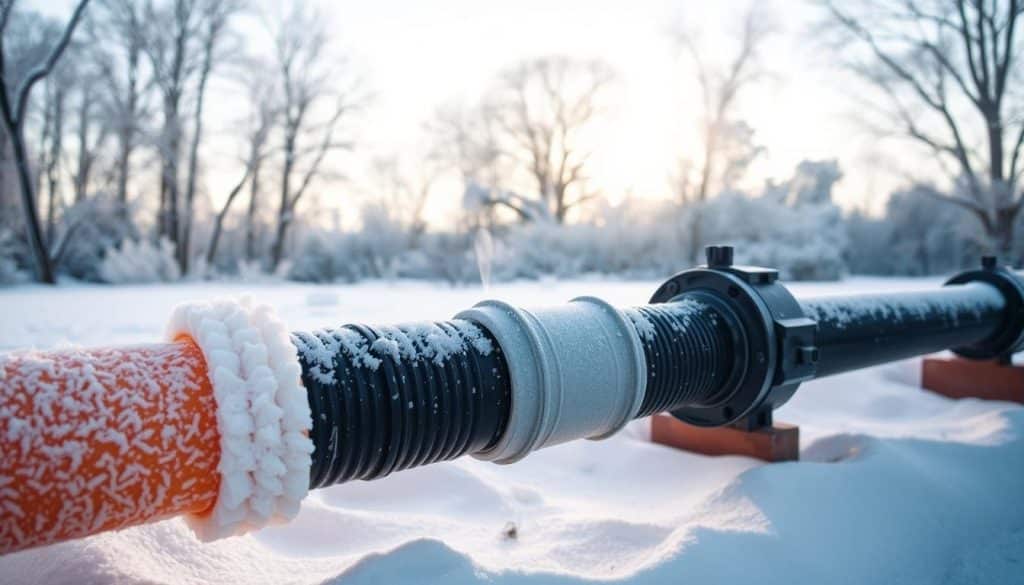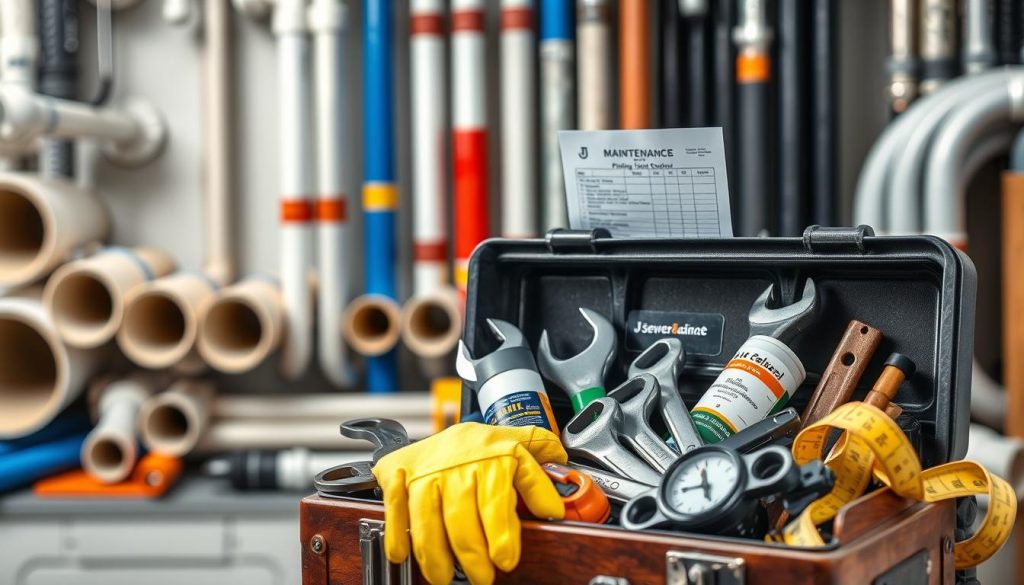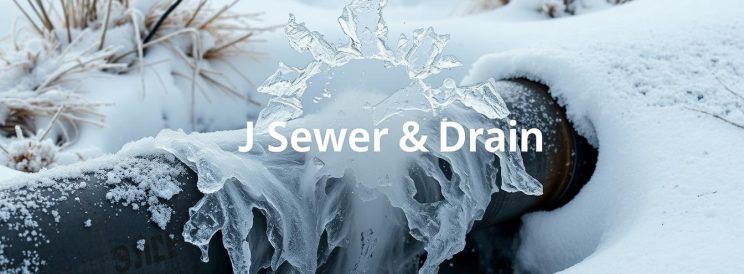Did you know fixing burst pipes can cost over $20,000? With colder and wetter winters predicted, the risk of pipes freezing goes up.How Can I Prevent my Pipes From Bursting in The Future? Homeowners need to act now to protect their homes and keep their minds at ease.
What steps can you take to keep your pipes safe during the cold? By following expert tips and taking care of your pipes, you can dodge the trouble and cost of burst pipes. Or for expert services, J Sewer & Drain Plumbing Inc. in Chicago, IL, offers help. They have a 5-year guarantee on sewer repairs and a 1-year warranty on plumbing services. Call them at (773) 968-2704 for help right away.
Key Takeaways
- Implementing preventative measures can save money and prevent extensive water damage.
- Insulation and sealing drafty areas are critical steps in protecting your pipes.
- Maintaining a constant thermostat temperature can reduce the risk of freezing pipes.
- Allowing faucets to drip during cold snaps ensures proper water flow, mitigating freeze risks.
- Regular pipe inspections and long-term maintenance further enhance home water pipe protection.
Why Pipes Burst During Winter
It’s important to know why pipes burst in winter to prevent it. The main reason is how water acts when it freezes. As it gets colder, water inside pipes expands and puts a lot of pressure on the walls. This can cause pipes to burst. Keeping your plumbing in good shape can help avoid this.
The Science Behind Freezing Pipes
Water expands when it freezes, which is why pipes burst. When water turns to ice, it gets about 9% bigger. This extra size puts a lot of pressure on the pipes. To stop pipes from bursting, it’s key to keep them warm and well-insulated.
Common Causes of Burst Pipes
Freezing isn’t the only reason pipes burst. Bad insulation makes pipes more exposed to cold. High water pressure also puts stress on pipes. Plus, corrosion can weaken pipes over time, making them more likely to burst.
Using good plumbing maintenance and keeping pipes well-insulated can help. This makes your home safer during winter.
Prevent Pipe Bursts with Insulation
Insulating your pipes is key to stopping them from bursting in cold winter months. Using the right insulation techniques can keep your plumbing safe from freezing. This helps avoid expensive damage to your home.

Insulate Exposed Pipes
Exposed pipes are at high risk in cold weather. Insulation is essential to protect them. Foam or fiberglass insulation keeps the temperature steady. In warmer places, newspaper can also work well.
By using these methods, you can greatly reduce the chance of pipes bursting.
Seal Drafty Areas
Sealing off drafts is also crucial to prevent pipe bursts. Cold air can enter unheated spots like basements and garages. This causes pipes to freeze quickly.
By finding and sealing these drafts, you add extra protection. This helps keep your pipes from freezing and bursting.
Keep Indoor Pipes Safe
Keeping your indoor pipes safe is key during the cold months. Using smart home heating and plumbing steps can prevent pipe damage.
Maintain a Constant Thermostat Temperature
Keeping your thermostat at a steady temperature is smart. It might seem odd, but it stops pipes from freezing. This simple trick is a top way to protect your pipes.
Open Cabinet Doors
Opening cabinet doors under sinks is also important. It lets warmer air reach the pipes, especially those by exterior walls. This helps keep pipes from freezing, which is a big plus.
Ensure Proper Water Flow
Keeping water flowing well in your pipes is key for good plumbing care. Simple steps can greatly lower the risk of pipes freezing and bursting.
Let Faucets Drip During Cold Snaps
Letting faucets drip a bit when it’s cold is a simple yet effective trick. It keeps water flowing, stopping it from freezing. Pay extra attention to faucets far from the water source or those with exposed pipes.
Monitor and Regulate Water Pressure
Too much water pressure can harm your plumbing, leading to pipe bursts. It’s important to check and keep water pressure at safe levels. If you hear banging or see leaks, fix them fast.
Also, using a pressure regulator can help keep your pipes safe. It ensures your plumbing stays in top shape.
How can I prevent my pipes from bursting in the future?
To stop pipes from bursting, you need regular care, proper insulation, and watch your home’s temperature. Check your plumbing often to spot early signs of trouble. A yearly check by a professional plumber can find weak spots.
Make sure all pipes in cold spots like basements and attics are well-insulated. You can buy insulation materials and install them yourself. Also, seal any drafts to keep cold air out of your pipes.
Keeping your home’s temperature steady is key, especially in winter. Keep your thermostat at a constant level day and night. Also, open cabinet doors under sinks to let warm air reach the pipes.
Watching your water flow is important too. Letting faucets drip in very cold weather can help. Also, check your water pressure often to catch problems early.
Long-term Pipe Maintenance Tips
To keep your plumbing system working well, you need to put in effort and pay attention. By following a few key maintenance tips, you can lower the chance of pipes bursting. This way, you can have a plumbing system that works reliably for many years.
Regular Pipe Inspections
One of the best maintenance tips is to check your pipes regularly. By doing this, you can spot problems like corrosion, leaks, or wear early on. This helps prevent bigger issues and keeps your pipes in good shape.

Install a Water Softener
Another important step is to get a water softener. Hard water can cause scale to build up in pipes, leading to blockages and corrosion. A water softener reduces these problems, helping to prevent pipe bursts and making your plumbing last longer. This approach keeps your system running smoothly and reduces the need for costly repairs.
Emergency Measures
When a pipe burst is imminent, quick action is key. Knowing how to find and turn off your water valves can protect your home from water damage. Using temporary pipe wraps can also help until a professional can fix it for good. Here’s how to act fast and right:
Locate and Shut Off Water Valves
The first step in an emergency is to find the main water shut-off valve. It’s usually near your house’s edge. Turning this valve off stops the water flow, preventing more damage while you look for a fix.
Use Temporary Pipe Wraps
For small leaks or to protect pipes in cold weather, temporary wraps are great. They act as a temporary fix, giving you time to get a permanent solution. With the water turned off, these wraps help prevent water damage by reducing leaks.
Conclusion
Keeping your pipes from bursting is key during winter. Freezing temperatures can cause pipes to expand and build up pressure. Homeowners can prevent this by insulating pipes, sealing leaks, and keeping the thermostat steady.
Simple steps can help keep your pipes safe. Open cabinet doors and run water from faucets when it’s cold. Also, check your pipes regularly and use a water softener. Being proactive can avoid big problems and costs later.
If pipes do burst, knowing how to act can help. Find and turn off water valves and use temporary wraps to fix pipes. These steps can protect your home from burst pipe damage, making winter safer and more comfortable.






